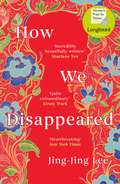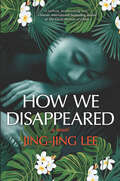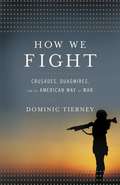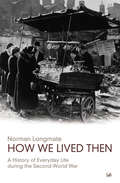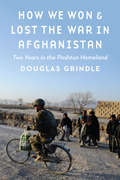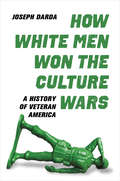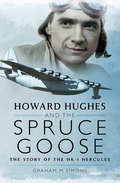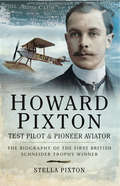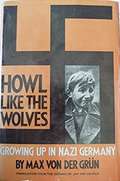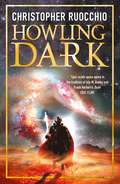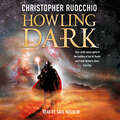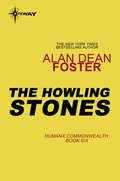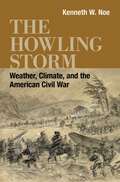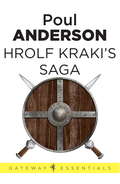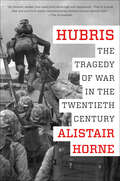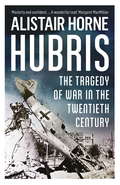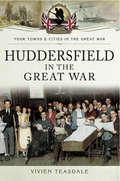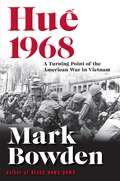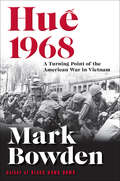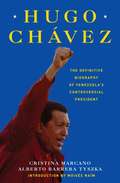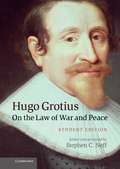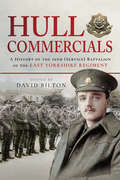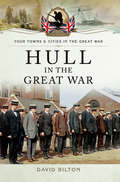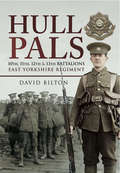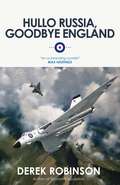- Table View
- List View
How We Disappeared
by Jing-Jing LeeThe heart-rending story of survival and endurance in Japanese-occupied Singapore Singapore, 1942. As Japanese troops sweep down Malaysia and into Singapore, a village is ransacked, leaving only three survivors, one of them a tiny child. In a neighbouring village, seventeen-year-old Wang Di is bundled into the back of a troop carrier and shipped off to a Japanese military brothel. After sixty years of silence, what she saw and experienced there still haunts her. And in the year 2000, twelve-year-old Kevin is sitting beside his ailing grandmother when he overhears a mumbled confession. He sets out to discover the truth, wherever it might lead, setting in motion a chain of events he could never have foreseen. Weaving together two timelines and two very big secrets, this evocative, profoundly moving and utterly dazzling debut opens a window on a little-known period of history, and heralds the arrival of a thrilling new literary star.
How We Disappeared: A Novel
by Jing-Jing LeeA twenty-first–century twelve-year-old seeks the truth behind his grandmother’s trauma in this moving novel of family, love, memory, and the toll of war.Singapore, 1942. As Japanese troops sweep down Malaysia and into Singapore, a village is ransacked, leaving only two survivors and one tiny child.In a neighboring village, seventeen-year-old Wang Di is strapped into the back of a troop carrier and shipped off to a Japanese military brothel where she is forced into sexual slavery as a “comfort woman.” After sixty years of silence, what she saw and experienced still haunts her.In the year 2000, twelve-year-old Kevin is sitting beside his ailing grandmother when he overhears a mumbled confession. He sets out to discover the truth, wherever it might lead, setting in motion a chain of events he never could have foreseen.Weaving together two timelines and two very big secrets, this stunning debut opens a window on a little-known period of history, revealing the strength and bravery shown by numerous women in the face of terrible cruelty. Drawing in part on her family’s experiences, Jing-Jing Lee has crafted a profoundly moving, unforgettable novel about human resilience, the bonds of family and the courage it takes to confront the past.Perfect for fans of Pachinko and We Were the Lucky Ones.Praise for How We DisappearedA Library Journal Emerging Stars Pick“This is a brilliant, heart-breaking story with an unforgettable image of how women were silenced and disappeared by both war and culture.” —Xinran, author of The Good Women of China“An exquisite mystery, an enthralling novel. Equally touching and intriguing.” —Eoin Dempsey, author of White Rose, Black Forest“A beautifully written, suspenseful story of redemption and healing.” —Booklist, starred review“A . . . story about memory, trauma and ultimately love, How We Disappeared explores the impact of the Japanese invasion of Singapore on the local people, in particular on the hellishly misnamed “Comfort Women.”“ —New York Times
How We Fight: Crusades, Quagmires, and the American Way of War
by Dominic TierneyAmericans love war. We've never run from a fight. Our triumphs from the American Revolution to World War II define who we are as a nation and a people. Americans hate war. Our leaders rush us into conflicts without knowing the facts or understanding the consequences. Korea, Vietnam, and now Iraq and Afghanistan define who we are as a nation and a people. How We Fight explores the extraordinary doublemindedness with which Americans approach war, and reveals the opposing mindsets that have governed our responses throughout history: the "crusade" tradition-our grand quests to defend democratic values and overthrow tyrants--and the "quagmire" tradition--our resistance to the work of nation-building and its inevitable cost in dollars and American lives. How can one nation be so split? Studying conflicts from the Civil War to the present, Dominic Tierney has created a secret history of American foreign policy and a frank and insightful look at how Americans respond to the ultimate challenge. And he shows how success is possible. His innovative model for tackling the challenges of modern war can mean longstanding victory in Iraq and Afghanistan, by rediscovering a lost American warrior tradition.
How We Lived Then: History of Everyday Life During the Second World War, A
by Norman LongmateAlthough nearly 90% of the population of Great Britain remained civilians throughout the war, or for a large part of it, their story has so far largely gone untold. In contrast with the thousands of books on military operations, barely any have concerned themselves with the individual's experience. The problems of the ordinary family are barely ever mentioned - food rationing, clothes rationing, the black-out and air raids get little space, and everyday shortages almost none at all. This book is an attempt to redress the balance; to tell the civilian's story largely through their own recollections and in their own words.
How We Won and Lost the War in Afghanistan: Two Years in the Pashtun Homeland
by Douglas GrindleDouglas Grindle provides a firsthand account of how the war in Afghanistan was won in a rural district south of Kandahar City and how the newly created peace slipped away when vital resources failed to materialize and the United States headed for the exit. By placing the reader at the heart of the American counterinsurgency effort, Grindle reveals little-known incidents, including the failure of expensive aid programs to target local needs, the slow throttling of local government as official funds failed to reach the districts, and the United States’ inexplicable failure to empower the Afghan local officials even after they succeeded in bringing the people onto their side. Grindle presents the side of the hard-working Afghans who won the war and expresses what they really thought of the U.S. military and its decisions. Written by a former field officer for the U.S. Agency for International Development, this story of dashed hopes and missed opportunities details how America’s desire to leave the war behind ultimately overshadowed its desire to sustain victory.
How White Men Won the Culture Wars: A History of Veteran America
by Joseph DardaReuniting white America after Vietnam. "If war among the whites brought peace and liberty to the blacks," Frederick Douglass asked in 1875, peering into the nation’s future, "what will peace among the whites bring?" The answer then and now, after civil war and civil rights: a white reunion disguised as a veterans’ reunion. How White Men Won the Culture Wars shows how a broad contingent of white men––conservative and liberal, hawk and dove, vet and nonvet––transformed the Vietnam War into a staging ground for a post–civil rights white racial reconciliation. Conservatives could celebrate white vets as deracinated embodiments of the nation. Liberals could treat them as minoritized heroes whose voices must be heard. Erasing Americans of color, Southeast Asians, and women from the war, white men could agree, after civil rights and feminism, that they had suffered and deserved more. From the POW/MIA and veterans’ mental health movements to Rambo and "Born in the U.S.A.," they remade their racial identities for an age of color blindness and multiculturalism in the image of the Vietnam vet. No one wins in a culture war—except, Joseph Darda argues, white men dressed in army green.
Howard Hughes and the Spruce Goose: The Story of the H-K1 Hercules
by Graham M. SimonsHoward Hughes' life ambition was to make a significant contribution to the field of aviation development. But the monumental folly of his endeavours on the H-KI Hercules meant that he came to be known and remembered to a great extent for all the wrong reasons. The 'Spruce Goose' (a name Hughes detested) became a product of his wild fixation on perfection and scale. Once completed, it was the largest flying machine ever built. Its wingspan of 320 feet remains the largest in history. Yet it only completed one flight; flying for a mile on its maiden voyage above Long Beach Harbour, before being consigned to the history books as a failure.Experienced author Graham M. Simons turns his attention to the production process that saw this colossus take shape. In words and images, all aspects of this process are illustrated. We have shots taken during the initial design period, images of the craft under construction, and photographs taken at the test flights. In addition, Simons has been gifted access to the highly prized and rarely seen aircraft manual produced for the aircraft, content from which has been extracted and used to supplement the narrative.The book goes on to explore the political issues that sprung up as a result of Hughes' endeavours, looking into the Senate War Investigations Committee's findings which explored the extent to which government funds had been utilised in the development and construction of the airship, adding a whole new layer of controversy to the proceedings.
Howard Pixton: Test Pilot & Pioneer Aviator: The Biography of the First British Schneider Trophy Winner
by Stella PixtonThis book is a truly remarkable account that captures the atmosphere, thrills and danger of the pioneering days of aviation. Howard Pixton was flying for A V Roe at Brooklands in 1910 when S F Cody at Laffan's Plain tried to persuade him to join him. But in 1911 he test flew A V Roe's 'tractor biplane, the forerunner of the 504. By now acknowledged as the first professional test pilot, he left A V to join Bristols and for two years demonstrated new models to dignitaries across Europe.In 1913 he joined Tommy Sopwith and in 1914 he became the first Briton in a British plane to win an international race, the coveted Schneider Trophy. This gave Britain air supremacy and Howard was feted as the finest pilot in the World. Sopwith's Tabloid aircraft developed into the 'Pup', and then into the 'Camel'. Throughout The Great War Pixton test flew many of the rapid evolving designs.For a biography of an early aviation pioneer of the top rank, this book cannot be bettered.
Howl Like the Wolves: Growing Up in Nazi Germany
by Max von der GrünThe author intersperses his account of his youth in Nazi Germany with numerous documents and photographs from that period.
Howling Dark: Book Two (Sun Eater)
by Christopher RuocchioThe second novel of the galaxy-spanning Sun Eater series merges the best of space opera and epic fantasy, as Hadrian Marlowe continues down a path that can only end in fire. Hadrian Marlowe is lost. For half a century, he has searched the farther suns for the lost planet of Vorgossos, hoping to find a way to contact the elusive alien Cielcin. He has not succeeded, and for years has wandered among the barbarian Normans as captain of a band of mercenaries. Determined to make peace and bring an end to nearly four hundred years of war, Hadrian must venture beyond the security of the Sollan Empire and among the Extrasolarians who dwell between the stars. There, he will face not only the aliens he has come to offer peace, but contend with creatures that once were human, with traitors in his midst, and with a meeting that will bring him face to face with no less than the oldest enemy of mankind. If he succeeds, he will usher in a peace unlike any in recorded history. If he fails...the galaxy will burn.
Howling Dark: Book Two (Sun Eater)
by Christopher RuocchioThe second novel of the galaxy-spanning Sun Eater series merges the best of space opera and epic fantasy, as Hadrian Marlowe continues down a path that can only end in fire. Hadrian Marlowe is lost. For half a century, he has searched the farther suns for the lost planet of Vorgossos, hoping to find a way to contact the elusive alien Cielcin. He has not succeeded, and for years has wandered among the barbarian Normans as captain of a band of mercenaries. Determined to make peace and bring an end to nearly four hundred years of war, Hadrian must venture beyond the security of the Sollan Empire and among the Extrasolarians who dwell between the stars. There, he will face not only the aliens he has come to offer peace, but contend with creatures that once were human, with traitors in his midst, and with a meeting that will bring him face to face with no less than the oldest enemy of mankind. If he succeeds, he will usher in a peace unlike any in recorded history. If he fails...the galaxy will burn.
The Howling Stones
by Alan Dean FosterThe newly discovered planet of Senisran is a veritable paradise, its oceans dotted with thousands of lush islands containing vast deposits of rare-earths and minerals. But Senisran is also the Humanx Commonwealth's problem child, for each island is inhabited by a different tribe of aboriginal natives. Each has to be negotiated with separately for mining rights - and the Commonwealth is locked in a race against the vicious AAnn Empire to secure those rights.The clans of the Parramat Archipelago on Senisran are resisting entreaties by the Commonwealth and AAnn alike. But Pulickel Tomochelor, xenologist and first-contact specialist, is confident of his ability to handle to negotiations. What Pulickel hasn't counted on is the secret of Parramat: the strange green stones that the natives use to bless the crops, ensure plentiful fishing, heal the injured and ill, and control the weather. For within those stones lies an awesome technology the origin of which is lost in time - a technology that has to be kept from the AAnn at any cost.The Humanx Commonwealth: Book Six.
The Howling Storm: Weather, Climate, and the American Civil War (Conflicting Worlds: New Dimensions of the American Civil War)
by Kenneth W. NoeTraditional histories of the Civil War describe the conflict as a war between North and South. Kenneth W. Noe suggests it should instead be understood as a war between the North, the South, and the weather. In The Howling Storm, Noe retells the history of the conflagration with a focus on the ways in which weather and climate shaped the outcomes of battles and campaigns. He further contends that events such as floods and droughts affecting the Confederate home front constricted soldiers’ food supply, lowered morale, and undercut the government’s efforts to boost nationalist sentiment. By contrast, the superior equipment and open supply lines enjoyed by Union soldiers enabled them to cope successfully with the South’s extreme conditions and, ultimately, secure victory in 1865. Climate conditions during the war proved unusual, as irregular phenomena such as El Niño, La Niña, and similar oscillations in the Atlantic Ocean disrupted weather patterns across southern states. Taking into account these meteorological events, Noe rethinks conventional explanations of battlefield victories and losses, compelling historians to reconsider long-held conclusions about the war. Unlike past studies that fault inflation, taxation, and logistical problems for the Confederate defeat, his work considers how soldiers and civilians dealt with floods and droughts that beset areas of the South in 1862, 1863, and 1864. In doing so, he addresses the foundational causes that forced Richmond to make difficult and sometimes disastrous decisions when prioritizing the feeding of the home front or the front lines. The Howling Storm stands as the first comprehensive examination of weather and climate during the Civil War. Its approach, coverage, and conclusions are certain to reshape the field of Civil War studies.
Hrolf Kraki's Saga (Gateway Essentials #10)
by Poul AndersonHis father had been slain in a heinous ambush; his grandfather, in an act of brotherly murder. His blood was of the Skjoldungs . . . and even the most unremarkable of seers knew his life would be as sweeping as it was savage.From the roiling midnight years before his birth, to the unshakable love and twisted fates that brought him to the throne of his ravaged Icelandic kingdom, Hrolf Kraki's magnificent saga is the story of an age of runes and ravishments, of blades and omens . . . and of a man who ruled and was ruled by an inescapable destiny.
Hubris: The Tragedy of War in the Twentieth Century
by Alistair Horne“Eminently provocative and readable.”—The Wall Street JournalSir Alistair Horne has been a close observer of war and history for more than fifty years and in this wise and masterly work, he revisits six battles of the past century and examines the strategies, leadership, preparation, and geopolitical goals of aggressors and defenders to reveal the one trait that links them all: hubris.In Greek tragedy, hubris is excessive human pride that challenges the gods and ultimately leads to total destruction of the offender. From the 1905 Battle of Tsushima in the Russo-Japanese War, to Hitler's 1941 bid to capture Moscow, to MacArthur's disastrous advance in Korea, to the French downfall at Dien Bien Phu, Horne shows how each of these battles was won or lost due to excessive hubris on one side or the other. In a sweeping narrative written with his trademark erudition and wit, Horne provides a meticulously detailed analysis of the ground maneuvers employed by the opposing armies in each battle. He also explores the strategic and psychological mindset of the military leaders involved to demonstrate how devastating combinations of human ambition and arrogance led to overreach. Making clear the danger of hubris in warfare, his insights hold resonant lessons for civilian and military leaders navigating today's complex global landscape.A dramatic, colorful, stylishly-written history, Hubris is a much-needed reflection on war from a master of his field.
Hubris: The Tragedy of War in the Twentieth Century
by Sir Alistair Horne CBEAlistair Horne has been a close observer of war and history for more than fifty years. In this wise and masterly work, he revisits six battles that changed the course of the twentieth century and reveals the one trait that links them all: hubris. From the Battle of Tsushima in the Russo-Japanese War of 1905 to Hitler's 1941 bid to capture Moscow, and from the disastrous American advance in Korea to the French surrender at Dien Bien Phu, Horne shows how each of these battles was won or lost due to excessive hubris on one side or the other.A dramatic, colourful and stylishly written history, HUBRIS is an essential reflection on war from a master of his field.
Huddersfield in the Great War (Your Towns & Cities in the Great War)
by Vivien TeasdaleWhen war was declared in August 1914, it not only changed the lives of the soldiers who fought, but also the lives of their families, their neighbourhood and, ultimately, the whole of society. Women came out of their homes to take up work in industry, to drive the trams, to police the streets as well as nurse the wounded. Government, local and national, imposed extensive controls on all aspects of social life - who could remain in work, who had to fight, what could be grown as crops, what clothes were appropriate and how to feed a family. This study looks at how these changes affected Huddersfield and its inhabitants, showing how employment changed, how the town contributed to financing the war and how the local tribunals dealt with those who did not want to fight. Local families, from the highest to the lowest walks of life, find their stories illustrated here.
Hué 1968: A Turning Point of The American War in Vietnam
by Mark Bowden<p>With unprecedented access to war archives in the U.S. and Vietnam and interviews with participants from both sides, Bowden narrates each stage of this crucial battle through multiple viewpoints. <p>Played out over 24 days and ultimately costing 10,000 lives, the Battle of Hue was by far the bloodiest of the entire war. When it ended, the American debate was never again about winning, only about how to leave. Hue 1968 is a gripping and moving account of this pivotal moment. <P><b>A New York Times Bestseller</b>
Hue 1968: A Turning Point of the American War in Vietnam
by Mark BowdenThe author of Black Hawk Down vividly recounts a pivotal Vietnam War battle in this New York Times bestseller: “An extraordinary feat of journalism”. —Karl Marlantes, Wall Street JournalIn Hue 1968, Mark Bowden presents a detailed, day-by-day reconstruction of the most critical battle of the Tet Offensive. In the early hours of January 31, 1968, the North Vietnamese launched attacks across South Vietnam. The lynchpin of this campaign was the capture of Hue, Vietnam’s intellectual and cultural capital. 10,000 troops descended from hidden camps and surged across the city, taking everything but two small military outposts.American commanders refused to believe the size and scope of the siege, ordering small companies of marines against thousands of entrenched enemy troops. After several futile and deadly days, Lieutenant Colonel Ernie Cheatham would finally come up with a strategy to retake the city block by block, in some of the most intense urban combat since World War II.With unprecedented access to war archives in the United States and Vietnam and interviews with participants from both sides, Bowden narrates each stage of this crucial battle through multiple viewpoints. Played out over 24 days and ultimately costing 10,000 lives, the Battle of Hue was by far the bloodiest of the entire war. When it ended, the American debate was never again about winning, only about how to leave.A Los Angeles Times Book Prize Finalist in HistoryWinner of the 2018 Marine Corps Heritage Foundation Greene Award for a distinguished work of nonfiction
Hugo Chávez
by Cristina Marcano Alberto Barrera TyszkaHe is one of the most controversial and important world leaders currently in power. In this international bestseller, at last available in English, Hugo Chávez is captured in a critically acclaimed biography, a riveting account of the Venezuelan president who continues to influence, fascinate, and antagonize America. Born in a small town on the Venezuelan plains, Chávez found his interests radically altered when he entered the military academy in Caracas...
Hugo Grotius on the Law of War and Peace
by Stephen C. NeffDespite its significant influence on international law, international relations, natural law and political thought in general, Grotius's Law of War and Peace has been virtually unavailable for many decades. Stephen Neff's edited and annotated version of the text rectifies this situation. Containing the substantive portion of the classic text, but shorn of extraneous material, this edited and annotated edition of one of the classic works of Western legal and political thought is intended for students and teachers in four primary areas: history of international law, history of political thought, history of international relations and history of philosophy.
Hull Commercials: A History of the 10th (Service) Battalion of the East Yorkshire Regiment
by David BiltonIn the 1930s five men wrote a history of the battalion they had proudly served with: the 1st Hull Battalion, known today as the 10th East Yorkshire Regiment or The Commercials. The book is the story of a happy family, men drawn together to fight for justice. There is no attempt to look at the bigger picture, and no attempt is made to comment on tactics or strategy; it is simply the story of a group of men and their travels across England, Egypt and the Western Front and what they achieved. Their love for their fellow soldiers and the battalion being clearly shown in early 1918 when the original members were all asked if they would like to train to become officers: the vast majority refused, preferring to stay in the ranks with their friends.The story is carefully crafted and based upon personal diaries, now long gone, and conversations between the participants. As well as the story of the battalions travels the appendices list awards, a diary of movement and a roll of honor. The editor, known for his work on the Hull Pals has added a complete listing of the original battalion, extra photographs, previously unpublished, and relevant footnotes.This book is the third book in the 1st Hull Pals trilogy and is essential reading for all interested in the Pals Battalions, providing a clear and concise record of a typical battalion at war.
Hull in the Great War (Your Towns & Cities in the Great War)
by David BiltonThe outbreak of war in 1914 aroused an enthusiasm in Hull and within the first six months 20,000 local men had enrolled. Hull was also attacked by Zeppelins and it raised its own Pals Battalions. This book looks at how the experience of war impacted on the City, from the initial enthusiasm for sorting out the German Kaiser in time for Christmas 1914, to the gradual realization of the enormity of human sacrifice the families of Hull were committed to as the war stretched out over the next four years. The Great War affected everyone. At home there were wounded soldiers in military hospitals, refugees from Belgium and later on German prisoners of war. There were food and fuel shortages and disruption to schooling. The role of women changed dramatically and they undertook a variety of work undreamed of in peacetime. Meanwhile, men serving in the armed forces were scattered far and wide. Extracts from contemporary letters reveal their heroism and give insights into what it was like under battle conditions.As featured in the Hull Daily Mail.
Hull Pals: 10th, 11th, 12th and 13th Battalions East Yorkshire Regiment (Pals Ser.)
by David BiltonIn response to Kitchener's famous call for a million volunteers, local communities raised entire battalions for the service on the Western Front. Hull folk are reticent people and the Hull Pals were no exception. This book tells their inspiring story of sacrifice and gallantry under appaling conditions. Hull Pals contains a great number of hitherto unpublished eye-witnessed accounts and photographs.As featured on BBC Radio Humberside and in The Yorkshire Post.
Hullo Russia, Goodbye England
by Derek RobinsonFlight Lieutenant Silk, a twice-decorated Lancaster pilot in WW II, rejoins the R. A. F. and qualifies to fly the Vulcan bomber. Piloting a Vulcan is an unforgettable experience: no other aircraft comes close to matching its all-round performance. And as bombers go, it's drop-dead gorgeous. But there's a catch. The Vulcan has only one role: to make a second strike. To act in retaliation for a Russian nuclear attack. Silk knows that knows that if he ever flies his Vulcan in anger, he'll be flying from a smoking wasteland, a Britain obliterated. But in the mad world of Mutually Assured Destruction, the Vulcan is the last - the only - deterrent. Derek Robinson returns with another rip-roaring, gung-ho R. A. F. adventure, one that exposes and confronts the brinkmanship and sabre-rattling of the Cold War Era.
